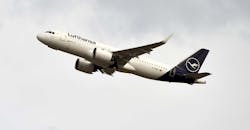Airbus Held Back by Production Snag With Rival Boeing in Crisis
Airbus SE cut its full-year delivery target and said cash flow will be lower than expected as it struggles to capitalize on the grounding of Boeing Co.’s 737 Max.
The company now expects to hand over about 20 fewer jets than it previously forecast as production challenges slow output of A320neo-series aircraft, it said in a statement Wednesday. The free cash flow goal was cut by a quarter.
Airbus has struggled to keep up with demand for the so-called cabin-flex version of the narrow-body’s A321 variant. The configuration allows airlines to choose between more seats or longer range by adding a new rear section and changing the door layout. The holdups come at a time when demand for the model is surging and with the rival Max idled after two fatal crashes.
“We are focused on the A320neo ramp-up and improving the industrial flow while managing the higher level of complexity,” Chief Executive Officer Guillaume Faury said in the release.
That will be especially vital as the flex layout becomes standard on the A321 next year and Airbus builds more LR or long-range variants of the plane, as well as working toward production of an even further-flying XLR option.
Airbus fell as much as 3.3% and was trading 2.5% lower at 122.62 euros as of 9:04 a.m. in Paris, paring gains this year to 47% and reducing the Toulouse, France-based planemaker’s market value to 96 billion euros ($107 billion). Boeing is up 8.2%.
The European manufacturer’s assembly lines are being stretched as single-aisle output reaches a record 60 jets a month, rising to 63 by 2021. At the same time, the A321 has become the group’s top-seller with 81 orders through September net of cancellations, a third more than for the baseline A320.
A380 Wind-Down
Adjusted profit before interest and tax rose 2% to 1.6 billion euros in the third quarter, more than the 1.36 billion euros estimated by analysts. That was before one-time costs from the A380 superjumbo program, which is being wound down, and Germany’s suspension of defense exports to Saudi Arabia.
Airbus stood by guidance for an increase in adjusted full-year Ebit of about 15% despite the scrapping of the 880-to-890-plane delivery goal and the reduced cash flow target of 3 billion euros -- something finance chief Dominik Asam said on a conference call reflects increased per-plane profitability.
The company won orders for 303 commercial jets through September, excluding cancellations, versus 170 at Boeing. Sales efforts have generally taken second place to the production push, with many airlines put off by long delivery times amid record backlogs, or waiting to see when the Max will fly again.
The order picture improved for Airbus Tuesday when Indian budget airline IndiGo announced a 300-plane deal for the A320neo worth $33 billion at list prices and ranking among Airbus’s biggest ever contracts. Faury said the blockbuster accord reflects generally healthy levels of industry demand.
At the same time, the imposition of U.S. import duties on foreign-built Airbus jets will become tougher to manage next year, the CEO said, while suggesting that an anticipated World Trade Organization ruling allowing the European Union to impose similar measures on Boeing will help level the playing field.
Faury said Airbus is working on a “corrective solution” for the A220 model -- formerly the Bombardier Inc. C Series -- which is no longer allowed to operate at full power at high altitudes following several incidents with its engines, including one in which pieces came off mid-flight.
Boeing CEO Dennis Muilenburg was grilled by Congress Tuesday and found himself defending his company’s right to approve its own designs, and quizzed on why the Max was allowed to remain in service after the first of two fatal crashes that killed 346 people.
The tab for the Max grounding hit $9.2 billion in the third quarter, with the company burning through more cash in the period than for almost 25 years.
About the Author
Bloomberg
Licensed content from Bloomberg, copyright 2016.
